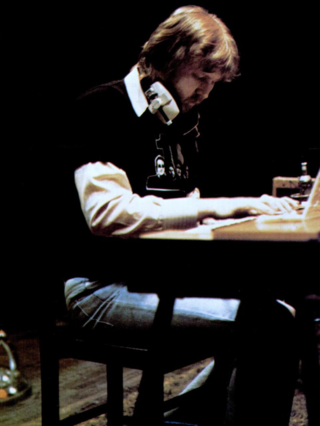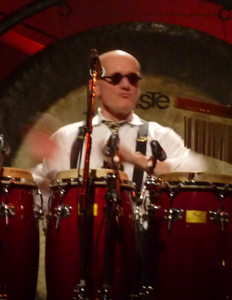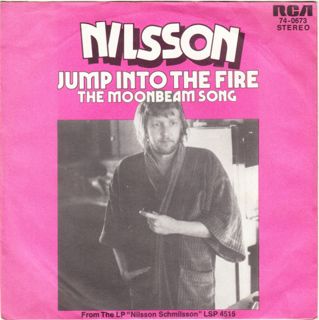Related Research Articles

The Weakest Link is a British television quiz show, mainly broadcast on BBC Two and BBC One. It was devised by Fintan Coyle and Cathy Dunning and developed for television by the BBC Entertainment Department. The game begins with a team of nine contestants, who take turns answering general knowledge questions within a time limit to create chains of nine correct answers in a row. At the end of each round, the players then vote one contestant, "the weakest link", out of the game. After two players are left, they play in a head-to-head penalty shootout format, with five questions asked to each contestant in turn, to determine the winner.

Harry Edward Nilsson III, sometimes credited as Nilsson, was an American singer-songwriter who reached the peak of his success in the early 1970s. His work is characterized by pioneering vocal overdub experiments, a return to the Great American Songbook, and fusions of Caribbean sounds. Nilsson was one of the few major pop-rock recording artists to achieve significant commercial success without performing major public concerts or touring regularly.

Michael Fenton Stevens is an English actor and comedian. He was a founder member of The Hee Bee Gee Bees and sang the lead on the Spitting Image 1986 number 1 hit "The Chicken Song". He also starred in KYTV, its Radio 4 predecessor Radio Active, Benidorm, and was an anchor on 3rd & Bird on CBeebies.

Laura Nyro was an American songwriter and singer. She achieved critical acclaim with her own recordings, particularly the albums Eli and the Thirteenth Confession (1968) and New York Tendaberry (1969), and had commercial success with artists such as Barbra Streisand and the 5th Dimension recording her songs. Wider recognition for her artistry was posthumous, while her contemporaries such as Elton John idolized her. She was praised for her emotive three-octave mezzo-soprano voice.
Marti Webb is an English actress and singer. She appeared on stage in Evita before starring in Andrew Lloyd Webber's one-woman show Tell Me on a Sunday in 1980. This included her biggest hit single, "Take That Look Off Your Face", a UK top three hit, with the parent album also reaching the top three.

Arena is a British television documentary series, made and broadcast by the BBC since 1 October 1975. Voted by TV executives in Broadcast magazine as one of the top 50 most influential programmes of all time, it has produced more than six hundred episodes directed by, among others, Frederick Baker, Jana Boková, Jonathan Demme, Nigel Finch, Mary Harron, Vikram Jayanti, Vivian Kubrick, Paul Lee, Adam Low, Bernard MacMahon, James Marsh, Leslie Megahey, Volker Schlondorff, Martin Scorsese, Julien Temple, Anthony Wall, Leslie Woodhead, and Alan Yentob.

A Little Touch of Schmilsson in the Night is a 1973 album of classic 20th-century standards sung by American singer Harry Nilsson. The album was arranged by Frank Sinatra's arranger Gordon Jenkins, and produced by Derek Taylor. This album is notable in being a standards album produced a decade before such works started to become popular again.

Raymond Cooper is an English musician who has worked as a session and road-tour percussionist. During his career, Cooper has worked and toured with numerous musically diverse bands and artists including Elton John, Harry Nilsson, Billy Joel, George Harrison, Paul McCartney, Ringo Starr, Pink Floyd, The Rolling Stones, Eric Clapton, Mark Knopfler, David Gilmour, Roger Waters and Art Garfunkel. Cooper absorbed the influence of rock drummers from the 1960s and 1970s such as Ginger Baker, Carmine Appice and John Bonham.

Julie Ann Felix was an American-British folk singer and recording artist who achieved success, particularly on British television, in the late 1960s and early 1970s. She later performed and released albums on her own record label.

The Troubadour is a nightclub located in West Hollywood, California, United States, at 9081 Santa Monica Boulevard just east of Doheny Drive and the border of Beverly Hills. Inspired by a visit to the newly opened Troubadour café in London, it was opened in 1957 by Doug Weston as a coffee house on La Cienega Boulevard, then moved to its current location shortly after opening and has remained open continuously since. It was a major center for folk music in the 1960s, and subsequently for singer-songwriters and rock. In 2011, a documentary about the club, Troubadours: Carole King / James Taylor & The Rise of the Singer-Songwriter, was released.

Leonard Geoffrey Feather was a British-born jazz pianist, composer, and producer, who was best known for his music journalism and other writing.

The Library of Congress Gershwin Prize for Popular Song is an award given to a composer or performer for their lifetime contributions to popular music. Created in 2007 by the United States Library of Congress, the prize is named after brothers George and Ira Gershwin, whose contributions to popular music included songs such as "I Got Rhythm", "Embraceable You", and "Someone to Watch Over Me", the orchestral pieces Rhapsody in Blue and An American in Paris, and the opera Porgy and Bess.
The Carpenters In Concert is the first episode of Series 4 of the BBC's In Concert music television series, directed and produced by Stanley Dorfman. The Carpenters début BBC concert; was filmed live in BBC Studios and first broadcast on BBC Two on 6 November 1971. The BBC later repeat-broadcast it under the name The Carpenters at the BBC.

Whicker's World was a British television documentary series that ran from 1959 to 1994, presented by journalist and broadcaster Alan Whicker.
Stanley Dorfman is a South African-born British music television director, producer, and painter. He is known as the co-creator and original producer and director of the world's longest running music television series, Top of the Pops. His work on the program contributed to the development of music videos.
"The Puppy Song" is a Harry Nilsson song that appeared on his album Harry released in August 1969. Nilsson originally wrote this song at Paul McCartney's request for Mary Hopkin, an 18-year-old singer that McCartney had signed to Apple Records and whose first album, Post Card would feature her version of Nilsson's song. David Cassidy released his version as a double A-side single with "Daydreamer", which reached No. 1 on the UK Singles Chart in 1973.
Alyn Shipton is an English jazz author, presenter, critic, and jazz bassist.

"Jump into the Fire" is a song by American singer-songwriter Harry Nilsson from his 1971 album Nilsson Schmilsson. It was also issued as the album's second single, after "Without You", and peaked at number 27 on America's Billboard Hot 100 chart and number 16 in Canada.
"This Could Be the Night" is a song recorded by the American band Modern Folk Quartet (MFQ) in 1965. The lyrics describe a couple on the verge of conquering their inhibitions. Written in tribute to the Beach Boys' leader Brian Wilson, the song is one of three that are credited jointly to Harry Nilsson and Phil Spector, although Nilsson submitted that he was the sole writer on a 1966 copyright form.

"Gotta Get Up" is a song written by American singer-songwriter Harry Nilsson and the opening track from his 1971 album Nilsson Schmilsson. It was first released as the B-side to his single "Without You". "Gotta Get Up" is an upbeat pop song with a music hall feeling and lyrics about transitioning from carefree youth to adult responsibility. Nilsson based the lyrics on his experiences working at a bank and on his parents.
References
- ↑ "BBC – In Concert – Episode guide". BBC. Retrieved 2023-06-04.
- ↑ "BBC In Concert - Aired Order - All Seasons - TheTVDB.com". thetvdb.com. Retrieved 2023-06-04.
- ↑ "RockPeaks – BBC In Concert". RockPeaks | Music Video Community. Retrieved 2023-06-04.
- ↑ "Stanley Dorfman: Turning Pop Into Culture". Newspapers.com. The Daily Post. 26 Jun 1973. p. 6. Retrieved 2023-06-05.
- ↑ "Catch BBC-2 – now, and perhaps never again, is the moment for courage, adventure, and the pursuit of excellence". Newspapers.com. The Guardian. 19 Apr 1974. p. 15. Retrieved 2023-06-05.
- ↑ Fiddick, Peter (14 Feb 1972). "Saturday Pop Television". Newspapers.com. The Guardian. p. 8. Retrieved 2023-06-22.
- ↑ Hepworth, David (2016). Never a Dull Moment: 1971 The Year That Rock Exploded. Henry Holt and Company. p. 149. ISBN 9781627793995.
- ↑ "BBC Programme Index search: "In Concert" between 1970 and 1974". genome.ch.bbc.co.uk. Retrieved 2023-06-22.
- ↑ "Leonard Cohen Sings Leonard Cohen". Newspapers.com. The Daily Telegraph. 1968-08-31. p. 14. Retrieved 2023-06-12.
- 1 2 Shipton, Alyn (2015). Nilsson: The Life of a Singer-Songwriter. Oxford University Press. pp. 358, 359, 369, 410, 411, 412. ISBN 978-0190263546.
- ↑ "BBC Programme Index: Joni Mitchell in Concert". genome.ch.bbc.co.uk. 1970-10-09. Retrieved 2023-06-20.
- ↑ "Joni Mitchell – 1970.10.09 | Joni Mitchell – In Concert | London". jonimitchell.com. Retrieved 2023-06-20.
- ↑ "Johnny Mercer: In Concert". BBC Programme Index. 1975-07-07. Retrieved 2023-06-12.
- ↑ "BBC Programme Index: Elton John In Concert". genome.ch.bbc.co.uk. 1970-10-23. Retrieved 2023-06-22.
- ↑ "Rock 'n' Roll History For June 6". www.classicbands.com. Retrieved 2023-06-22.
- ↑ Zollo, Paul (2020-10-26). ""Your Song," by Elton John & Bernie Taupin, Turns 50 Today". American Songwriter. Retrieved 2023-06-22.
- ↑ Greene, Andy (2013-08-13). "Elton Sings 'Your Song' Across the Decades". Rolling Stone. Retrieved 2023-06-22.
- ↑ "BBC Programme Index: The Carpenters". genome.ch.bbc.co.uk. 1971-11-06. Retrieved 2023-06-22.
- ↑ "BBC Programme Index: The Carpenters at the BBC". genome.ch.bbc.co.uk. 2011-05-26. Retrieved 2023-06-22.
- 1 2 "Carole King In Concert: Live at the BBC 1971 | Carole King". www.caroleking.com. Retrieved 2023-06-22.
- ↑ "BBC Programme Index: Carole King In Concert". genome.ch.bbc.co.uk. 1971-10-02. Retrieved 2023-06-22.
- ↑ Wolk, Douglas (2015-11-12). "Carole King Reflects on Her Classic, Chart-Topping 'Tapestry' Album". Billboard. Retrieved 2023-06-22.
- ↑ jbarone (2021-09-15). "Legacy Recordings Announces Limited Edition Vinyl Exclusives For RSD Black Friday 2021". Legacy Recordings. Retrieved 2023-06-22.
- 1 2 "Mr. Music scores again". Daily Mirror . 29 Apr 1972. p. 13. Retrieved 2023-06-05– via newspapers.com.
- ↑ "The second in the new In Concert series features Laura Nyro". The Evening Post. November 20, 1971. p. 3. Retrieved June 5, 2023.
- ↑ "BBC Programme Index: Laura Nyro In Concert". genome.ch.bbc.co.uk. 1971-11-20. Retrieved 2023-06-22.
- ↑ "BBC Programme Index: Cat Stevens: In Concert". genome.ch.bbc.co.uk. 1971-11-27. Retrieved 2023-06-22.
- ↑ "Back to the Bronze Age". Reading Post . Retrieved 2023-06-22– via British Newspaper Archive.
Third musician to get the Stanley Dorfman seal of approval is Cat Stevens, In Concert tonight. A regular chart-topper until ill-health forced him out of the pop scene altogether.
- ↑ Tobler, John (1982). The record producers. Internet Archive. London : British Broadcasting Corp. p. 66. ISBN 978-0-563-17958-0 – via archive.org.
As for [Nilsson's] lack of live performances, I just feel that that was what ultimately prevented him from being a superstar all over the world. For a while, the mystique of it all was interesting, and perhaps if it were happening today, where there are more opportunities for audio-visual devices, he could have over- come it. He did do the In Concert series on BBC television with Stanley Dorfman, which was very popular at the time. His show was very interesting and innovative with a lot of new technology, multiple images and things like that, but I think any artist, with very few exceptions and none that I can really think of, can immeasurably enhance his career by appearing in front of the public.
- ↑ Shipton, Alyn (2013). Nilsson: the life of a singer-songwriter. Internet Archive. New York : Oxford University Press. p. 113. ISBN 978-0-19-975657-5 – via Internet Archive.
Nilsson was intrigued by the prospect of making a concert appearance that was not, in reality, a concert. So, remarkably, Nilsson agreed to visit London in 1971 to record the show.
- ↑ Shipton, Alyn (2013). Nilsson: the life of a singer-songwriter. Internet Archive. New York: Oxford University Press. p. 131. ISBN 978-0-19-975657-5 – via Internet Archive.
But, according to Nilsson, Dorfman was as convincing as he had been when he visited the singer's house the previous year: "[In] a gentle, persuasive way [he] said we could do the first In Concert without an audience. That I found appealing and attractive.'
- ↑ Shipton, Alyn (2013). Nilsson : the life of a singer-songwriter. Internet Archive. New York : Oxford University Press. ISBN 978-0-19-975657-5.
- ↑ Budd, Christopher (2 August 2018). "Stanley Dorfman". SHINDIG! Magazine. Sliverback Publishing. pp. Issue 82. Retrieved 23 June 2018.
- ↑ Riefe, Jordan (2016-02-11). "Music Video Pioneer Stanley Dorfman Recalls Bowie, Sinatra and Lennon". The Hollywood Reporter . Retrieved 2023-06-02.